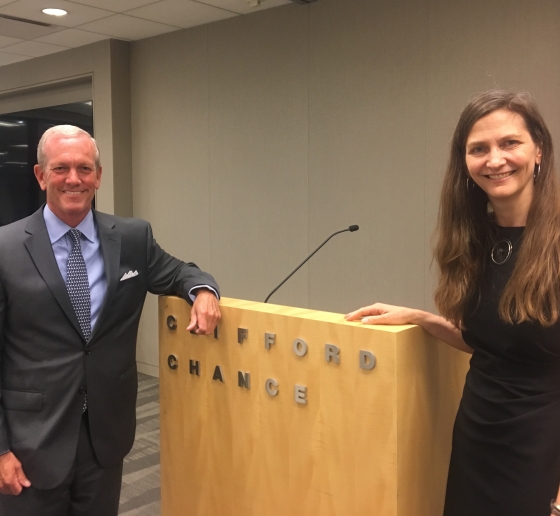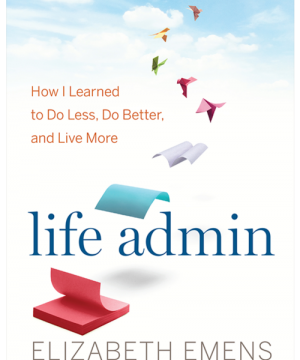Elizabeth Emens on the Invisible Work of Everyday Life
In her book “Life Admin,” Professor Emens explores how unseen and unpaid work is a universal problem but a particular burden for disadvantaged and disabled people.

Photo: Nick Williams ’88, partner and chair of the hiring committee at Clifford Chance, and Columbia Law School Professor Elizabeth Emens.
“I set out to write an idea book that would help people,” said Columbia Law School Professor Elizabeth Emens on July 10, when she delivered the annual Clifford Chance Thought Leadership Lecture on Diversity at the New York offices of the law firm Clifford Chance.
Despite its title—Life Admin: How I Learned to Do Less, Do Better, and Live More—the book is neither a memoir nor a how-to guide. Life Admin is a treatise on how the managerial aspects of one’s personal life—what Emens calls “admin”—are hurdles that slow us down and divert us as we race through our lives. Ordinary but necessary tasks—such as seeking help to retrieve lost contacts from a cell phone, arranging childcare, or organizing a parent’s funeral—amount to “an unpaid and unseen second job, with consequences often overlooked and underappreciated,” she says.
The genesis for Emens’s book was an academic article, “Admin,” which The Georgetown Law Journal published in 2015. “As I began presenting it to other academics, the response was far more intense than I’d anticipated,” she said. “Law professors in the audience were saying I’d seen into their minds and marriages.” (Emens added that one of her students described life admin as “a lot of stuff my parents do.”)
The financial and opportunity costs of life admin can be staggering. Emens, an Isidor and Seville Sulzbacher Professor of Law, cited one study that said American families devoted 30 million hours annually to filling out college financial aid forms; another report calculated that 20 percent of U.S. households could have saved a combined $5.4 billion by refinancing their mortgages, but most didn’t because the process was too complicated or time-consuming. She pointed out that Chile and the United Kingdom ease admin burdens by sending their citizens pre-filled tax forms to approve instead of asking them to fill them out. California experimented with pre-filled returns, she said, but the owners of TurboTax spent millions lobbying to kill the program.
Admin operates as a “parallel shift” with particularly serious consequences for people who have low incomes. “The parallel shift is a very different kind of job when you’re poor versus when you're rich,” Emens said this spring at Columbia Law School when she delivered a related lecture for students and faculty, which also was part of the endowed Clifford Chance program. “The stakes of poverty admin are higher. I can ignore my snail mail and let it pile up in the hallway for a week or more. For someone on public benefits, delays in your admin can lead to losing your home. And it’s much harder to do the office work of life without an actual office and office equipment.”
Life Admin has spawned a new project on “Identity Admin,” in which Emens is centering her analysis on people with disabilities who face an onslaught of time-consuming tasks:
- Medical admin: researching ailments and doctors, scheduling appointments, dealing with insurance companies and billing;
- Benefits admin: learning about, applying for, and supplying evidence to receive benefits for the disability; renewing and re-documenting benefits; investigating what benefits are offered; and
- Discrimination admin: contesting biased or unfair treatment, requesting accommodations for a disability at school or work.
Indeed, Emens quoted a woman she interviewed with cerebral palsy who said of the challenges she faces, “A lot of it is bureaucracy, not really disability.”
To explain the overlapping concerns of the disability rights movement, Emens quoted from a memoir, My Body Politic, by Simi Linton, an author and arts consultant, who uses a wheelchair: “If I want to go to vote or use the library, and these places are inaccessible, do I need a doctor or lawyer?”
Lawyers, said Emens, become key players in the “social model” of disability—the concept that disability exists in the interaction between impairment and the surrounding social environment. As Emens put it, “When Linton’s wheelchair is damaged on an airplane, is that a social problem or a medical problem?”
Emens made it clear why admin is not a frivolous topic but one that demands policy interventions. She said well-educated lawyers should consider the complexity of some of the admin they encounter vis-à-vis the challenges for less privileged citizens. “You have to face the question of whether a person dealing with serious depression on top of poverty, say, is going to be the best able to compete in some complicated housing lottery for public housing. Surely not,” she said. “That person arguably needs that public housing the most. And, so, if we want to distribute benefits in a way that is rationally related to our aims and values, we need to see the life admin involved and reform our methods of service delivery.”
At the end of the lecture, Emens asked her audience to consider the jumble of admin concerns that clients face. “What aspects of the identity of clients you’ve worked with or plan to work with, as the focus of your job or in pro bono work, lead to unequal admin burdens for them?” she said. “How can you use this information to do justice, make change, and make the world better?”
Emens’ talk struck a nerve with her audience at Clifford Chance. “Professor Emens’ presentation on Life Admin was riveting and really resonated with our attorneys and business services team members,” says Nick Williams ’88, partner and chair of the hiring committee at Clifford Chance. “We are so fortunate to partner with the talented team of professors from Columbia Law School, my alma mater, on our Clifford Chance Thought Leadership Initiative on Diversity. The lecture series is always one of my favorite programs of the year.”
# # #
Published on July 22, 2019
